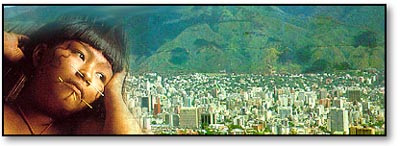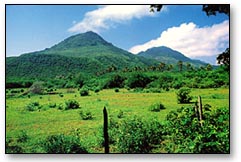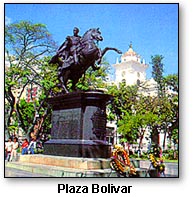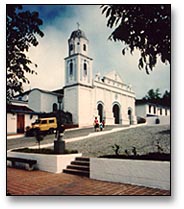
VENEZUELA
History and Culture
In ancient times, Venezuela was paradise for the Indians
who lived on its beaches, in its tropical forests, and on the gentle grassland of the llanos. There were three main groups: the Carib, Arawak, and the Chibcha. They
lived in small groups and all of them practiced some degree of farming; the land, however,
was bountiful enough so that this was not always a necessity. They could easily hunt, fish
for, and gather their food. The most advanced of the three were the Chibcha who lived on
the eastern slopes of the Andes. Though they never developed large cities, their
agricultural skill were formidable: they terraced parts of the Andes and built
sophisticated irrigation channels to water their crops.
llanos. There were three main groups: the Carib, Arawak, and the Chibcha. They
lived in small groups and all of them practiced some degree of farming; the land, however,
was bountiful enough so that this was not always a necessity. They could easily hunt, fish
for, and gather their food. The most advanced of the three were the Chibcha who lived on
the eastern slopes of the Andes. Though they never developed large cities, their
agricultural skill were formidable: they terraced parts of the Andes and built
sophisticated irrigation channels to water their crops.
Christopher Columbus was the first European to visit Venezuela. He came in
1498 during his third voyage to the New World, and landed on the Peninsula
de Paria. Following the coast,
he explored the Rio Orinoco Delta and concluded that he had found much more
than another Caribbean island. More explorers came a year later, and it was
Alonso de Ojeda who gave
the country its name. Arriving at Lake Maracaibo, he admired the stilted
houses that the Indians had build above the lake and called the place Venezuela
- "Little
Venice." A year after that the Spanish established their first settlement,
Nueva Cadiz, which was later destroyed by a tsunami. Early colonization in
Venezuela was much
less rampant than it was in other parts of South America, and the colony
was ruled with a loose hand from Bogota. It was much less important to the
Spanish than the
mineral-producing colonies of Western South America, but Venezuela would
later surprise the world when massive oil reserves would be discovered.
Venezuela may have been a quiet outpost on the edge of the Spanish Empire, but it gave
birth to the man who would one day turn that empire on its head: Simon Bolivar. With the
help of British mercenaries, Bolivar and his followers
campaigned against the Spanish tirelessly, marching across the Andes and liberating
Colombia in 1819, Venezuela in 1821, and Ecuador, Peru, and Bolivia in 1825. Much of his
army was composed of native Venezuelans. Independence did not prove easy for the new
nation. Civil strife, wars, and dictatorships raged in the country well into the next
century. Though some dictators sought real reform, most milked their positions for
personal gain. Border disputes with the British colony of Guyana erupted in the 1840s, and
although they never boiled over into full-fledged warfare, Venezuela still disputes the
border to this day.
mercenaries, Bolivar and his followers
campaigned against the Spanish tirelessly, marching across the Andes and liberating
Colombia in 1819, Venezuela in 1821, and Ecuador, Peru, and Bolivia in 1825. Much of his
army was composed of native Venezuelans. Independence did not prove easy for the new
nation. Civil strife, wars, and dictatorships raged in the country well into the next
century. Though some dictators sought real reform, most milked their positions for
personal gain. Border disputes with the British colony of Guyana erupted in the 1840s, and
although they never boiled over into full-fledged warfare, Venezuela still disputes the
border to this day.
In the early 1900s, the conflict-ridden nation finally began to get on its economic feet
with the discovery of oil, and by the 20s Venezuela was beginning to reap the benefits.
Unfortunately, most of the wealth remained with the ruling class, and the plague of
dictators continued until 1947 when Romulo Betancourt led a popular revolt and rewrote the
constitution. The first president-elect in Venezuela's history took office the same year,
the novelist Romulo Gallegos. Unfortunately, he was ousted by another dictator and the
country did not experience a non-violent presidential succession until 1963. For the next
25 years, things went comparatively well. An oil boom in the mid-1970s saw enormous wealth
pour into the country, though, as always, the vast lower class benefited little. Oil
prices dropped in the late 80s and once again the country was thrown into crisis. Riots
swept through Caracas and were violently repressed, and two coup attempts took place in
1992. Right now, the nation's stability and future are uncertain.
 Despite
a rough history, Venezuelans are infamous in South America for their easy-going nature and
fun-loving spirit. Their national mythology hails back to the days when independent and
rugged settlers tamed the lawlessness of the llanos, a heritage not unlike that of the
American West. Most Venezuelans them come from a mix of European, Indian, and African
roots, while a minority are exclusively white, black, or Indian. Roman Catholicism is the
overwhelmingly dominant religion.
Despite
a rough history, Venezuelans are infamous in South America for their easy-going nature and
fun-loving spirit. Their national mythology hails back to the days when independent and
rugged settlers tamed the lawlessness of the llanos, a heritage not unlike that of the
American West. Most Venezuelans them come from a mix of European, Indian, and African
roots, while a minority are exclusively white, black, or Indian. Roman Catholicism is the
overwhelmingly dominant religion.
Copyright (c) 1998-2010 interKnowledge Corp. All rights reserved.
